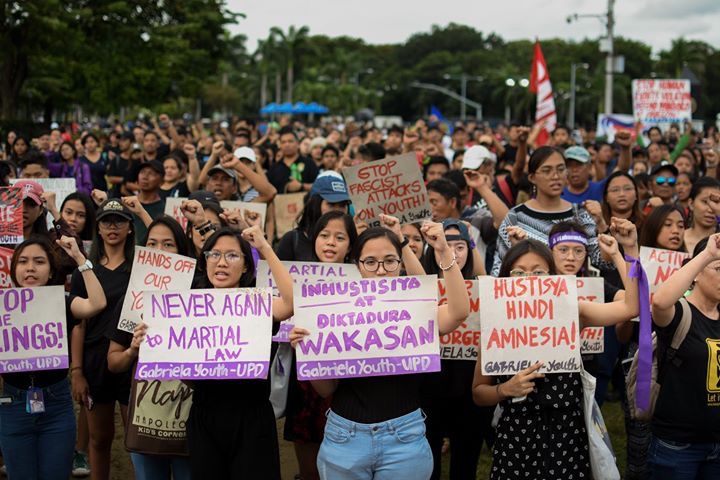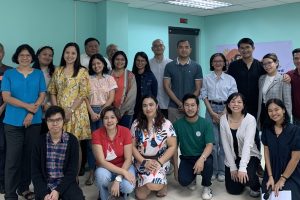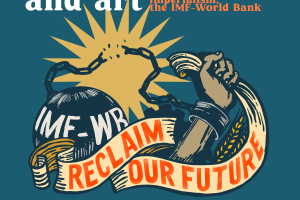Photo by Carlo Manalansan / Bulatlat
We support the adoption of a resolution on the Philippines at the 45th Session of the UN HRC. We echo the calls for an “immediate, impartial, transparent, independent and meaningful” investigation on the Philippine rights situation, and acknowledge countries’ efforts in championing the case of the Philippines.
With the continued systematic killings and rights violations in the Philippines, IBON International joins movements and civil society in the country in calling for international solidarity and support.
We support the adoption of a resolution on the Philippines at the 45th Session of the UN Human Rights Council (HRC). Any form of international cooperation, including monitoring mechanisms, should start from the stand point that the human rights situation in the country is worsening, with state accountability as duty-bearer being fundamental. We echo the calls for an “immediate, impartial, transparent, independent and meaningful” investigation on the Philippine rights situation, and acknowledge countries’ efforts in championing the case of the Philippines.
The current Philippine rights situation draws similarities from the Martial Law of deposed Philippine dictator Marcos, notorious for staggering rights violations, impunity, corruption and plunder. The Duterte administration is a known ally of the late dictator’s relatives. “Persistent impunity,” a “rapidly deteriorating” rights situation, and the “suppression of the democratic rights of Filipino workers”—as cited in a June 2020 OHCHR report, a September European Parliament resolution, and a September Council of Global Unions statement—all alarmingly reflect the prevailing norm.
Since the June UNHRC session on the Philippines, the false “drug war” still kills in urban poor communities. Amid the formal effect of the 2020 Terror Law, and what the UNOffice of the High Commissioner on Human Rights (OHCHR) called the “heavy-handed security approach” in pandemic response, social activists are still targeted with killings, arrests, and harassment.
The current Philippine rights situation draws similarities from the Martial Law of deposed Philippine dictator Marcos, notorious for staggering rights violations, impunity, corruption and plunder. “Persistent impunity,” a “rapidly deteriorating” rights situation, and the “suppression of the democratic rights of Filipino workers” all alarmingly reflect the prevailing norm.
We vehemently condemn the continued killings. More than 150[i] people have been killed during the lockdowns on so-called “drug” campaigns, adding to tens of thousands of victims.Hundreds of rights and environmental defenders have also been killed, as state actors continue to vilify and spout harmful allegations. The Philippines is only next to Colombia with the highest number of environmental activists killed for 2019; already 274 peasants have been killed under the current administration.
Since August, seventy-one-year-old peasant advocate Randy Echanis was killed in his own rented apartment amid militarised police presence in Manila, with evidence of torture and prolonged suffering. Community health worker and woman rights defender Zara Alvarez was killed, amid the pandemic, in Negros province, central Philippines.In Cotabato, southern Philippines, Indigenous Lumad-Manobo leader Bae Merlin “Milda” Ansabu Celis, known for defending ancestral lands from corporate plunder of Dole Stanfilco, was brutally killed. State forces massacred the Kabacan 9, nine Moro farmers including two minors, in broad daylight—with the rights commission confirming direct police involvement.
We are extremely concerned about continued harassment, arrests, and pretexts for repression. In Zambales province, military forces are responsible for dehumanising treatment and torture against Aeta indigenous leaders. Transport sector leader Ramon Rescovilla and activist Nelsy Rodriguez were arrested, in Bicol region, on false charges. The “front” allegations against IBON, which creates pretexts for cracking down on the institution, has appeared yet again in a May 2020 government report to the UNHRC, whichdenies rights defenders’ legitimate concerns on the Philippine rights situation.
We believe that realities belie the international rhetoric of Philippine state representatives about the adequacy of domestic mechanisms. Despite claims for a government panel on extra-judicial killings, this has neither led to conviction, prosecution, nor justice that matches the systematic nature of the continued killings on “drug-related” pretexts and otherwise. Prospects under current systems are elusive when movements and civil society are vilified and killed for their work on people’s rights. Activists point out that state “counterinsurgency” campaigns have precisely licensed political killings and other attacks in the name of anti-communist repression, now hiding under the guise of anti-“terrorism”.
We believe that realities belie the international rhetoric of Philippine state representatives about the adequacy of domestic mechanisms. Prospects under current systems are elusive when movements and civil society are vilified and killed for their work on people’s rights.
It is institutionalised via the National Task Force to End Local Communist Armed Conflict (NTF-ELCAC), created under the President’s Executive Order No. 70 and composed of military men occupying key government posts in the current de facto dictatorship. Despite criticisms from the national Commission on Human Rights and from movements,the budget allocations for the NTF is bound to drastically increase by 2,969 percent, from PhP 622.3 million (USD 12.8 million) in 2020 to PhP 19.3 billion (USD 398.5 billion) in 2021.This 2021 proposalis three times higher than for COVID-19 response allocations.[ii]
The failures of the domestic systems also manifest in the case of Echanis’ killing, with state forces taking away his body from his family, in a possible attempt at tampering with potential evidence. A recent Presidential absolute pardon forUS Marine Pemberton, despite his homicide conviction for killing Filipina transwoman Jennifer Laude, shows the same limits of the justice system – amid US-Philippine security agreements, including “counter-terror” priorities that now serve state repression.
We call on people’s organisations, civil society, progressive lawyers, church people, artists, and parliamentarians to join the Philippine movements’ calls: never again to military dictatorship and state atrocities against the people. September has been designated as a Month of Global Solidarity for the Philippines, by movements and organisations under the International League of Peoples’ Struggle.
We call on people’s organisations, civil society, progressive lawyers, church people, artists, and parliamentarians to join the Philippine movements’ calls: never again to military dictatorship and state atrocities against the people. We encourage concerned organisations and individuals to show their support by releasing statements addressed to their governments and to the Philippine government.
Last 14 September,a Global Day of Action for the Philippines was held, coinciding with the opening of the 45th Regular Session of the UN HRC. More than 700 groups worldwide, including IBON International, co-signed a joint statement calling to end state killings in the Philippines and urging the UNHRC to initiate an independent investigation.[iii] Such efforts must be sustained until our calls are heeded.On 18 September, development workers under the banner of the Council for People’s Development and Governance, a Philippine-based broad national network of development organisations, filed a petition against the 2020 “Terror Law,” adding to dozens of petitions already filed.
We encourage concerned organisations and individuals to show their support by releasing similar statements addressed to their governments and to the Philippine government, calling to end the killings in the country; to rescind current policy that sanctions attacks against activists, including the Executive Order No. 70 and the 2020 “Terror Law”;to demand justice for victims and accountability from all state perpetrators; and to end military aid and support to the militarist regime in the Philippines. ###
[i]https://cnnphilippines.com/news/2020/9/9/Human-Rights-Watch-drug-war-worsened-COVID-pandemic.html
[ii] https://www.philstar.com/opinion/2020/09/12/2041769/huge-anti-insurgency-fund-amid-covid-19-poverty-rise
[iii]https://www.karapatan.org/stop+the+killings+un+human+rights+council+investigate+the+human+rights+situation+in+the+philippines



